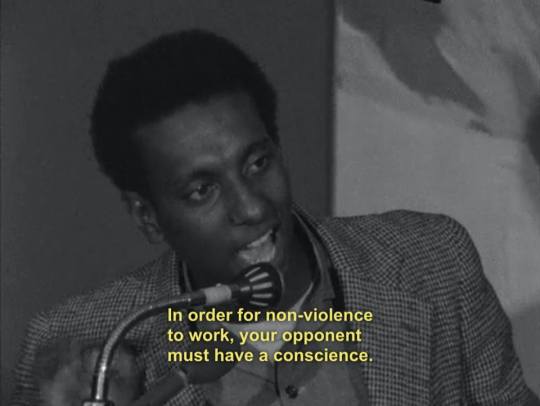#Ferguson
Text
#agust d#Ferguson#remus x sirius#negan#isteri#superstore#workouts#booksbooksbooks#random moodboard#seohyun#goth makeup
127 notes
·
View notes
Text


[ID: Two black and white photos of Kwame Ture/Stokely Carmichael, a young Black man, saying into a microphone with a sardonic expression, "In order for non-violence to work, your opponent must have a conscience. The United States has none, has none." End ID.]
#Kwame Ture#Stokely Carmichael#Pacifism#anti colonialism#antifashism#antifascism#antifashist#antifascist#got tired of seeing the inaccessible version knowing there's doznes of IDs buried in the comments#described images#accessible photos#Black Panthers#Black Power#Student Nonviolent Coordinating Committee#SNCC#non-violence#peace#united states#politics#ferguson#From the river to the sea Palestine will be free#free Palestine#free gaza#Gaza#Palestine#BLM#Black Lives Matter#Landback
922 notes
·
View notes
Text
“And so if we say abolish the prison-industrial complex, as we do, we should also say abolish apartheid, and end the occupation of Palestine!
In the United States when we have described the segregation in occupied Palestine that so clearly mirrors the historical apartheid of racism in the southern United States of America and especially before Black audiences the response often is: "Why hasn't anyone told us about this before? Why hasn't anyone told us about the segregated highways leading from one settlement to another, about pedestrian segregation regulated by signs in Hebron not entirely dissimilar from the signs associated with the Jim Crow South. Why hasn't anyone told us this before?"
Just as we say "never again" with respect to the fascism that produced the Holocaust, we should also say "never again" with respect to apartheid in South Africa, and in the southern US. That means, first and foremost, that we will have to expand and deepen our solidarity with the people of Palestine. People of all genders and sexualities. People inside and outside prison walls, inside and outside the apartheid wall.
Boycott G4S! Support BDS!
Palestine will be free!”
—“Ferguson Reminds Us of the Importance of a Global Context” (2014, PDF), Angela Davis interviewed by Frank Barat.
738 notes
·
View notes
Text
The point that I’m making is that while racist police violence, particularly against Black people, has a very long history, going back to the era of slavery, the current context is absolutely decisive. And when one examines the ways in which racism has been further reproduced and complicated by the theories and practices of terrorism and counterterrorism, one begins to perhaps envision the possibility of political alliances that will move us in the direction of transnational solidarities. What was interesting during the protests in Ferguson last summer was that Palestinian activists noticed from the images they saw on social media and on television that tear-gas canisters that were being used in Ferguson were exactly the same tear-gas canisters that were used against them in occupied Palestine. As a matter of fact, a US company, which is called Combined Systems, Incorporated, stamps “CTS” (Combined Tactical Systems) on their tear-gas canisters. When Palestinian activists noticed these canisters in Ferguson, what they did was to tweet advice to Ferguson protesters on how to deal with the tear gas. They suggested, among other things: “Don’t keep much distance from the police. If you’re close to them, they can’t tear gas,” because they would be teargassing themselves. There was a whole series of really interesting comments for the young activists in Ferguson, who were probably confronting tear gas for the first time in their lives. They didn’t necessarily have the experience that some of us older activists have with tear gas.
I’m trying to suggest that there are connections between the militarization of the police in the US, which provides a different context for us to analyze the continuing, ongoing proliferation of racist police violence, and the continuous assault on people in occupied Palestine, the West Bank, and especially in Gaza, given the military violence inflicted on people in Gaza this past summer.
Angela Davis from "Transnational Solidarities" in Freedom Is a Constant Struggle: Ferguson, Palestine, and the Foundations of a Movement (2016)
180 notes
·
View notes
Text
https://mary-074.szhdyy.com.cn/ik/ZqsKPHr
#poetry#noah schnapp#on my block#nct dream smut#dirk gently#fbb#adobe#sm#selena gomez#kim possible#dont worry darling#Ferguson#negan#superstore
128 notes
·
View notes
Text
#sm#Joaquin Phoenix#selena gomez#bibliophile#kim possible#dont worry darling#agust d#Ferguson#remus x sirius#negan#superstore#workouts#booksbooksbooks#self help#ladybug
129 notes
·
View notes